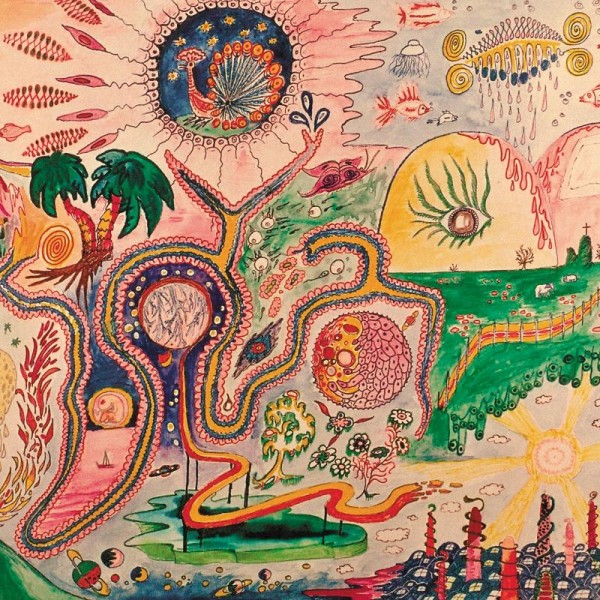
“Don’t stop imagining. The day that you do is the day that you die”—a powerful mantra like this one is surprisingly regular in the context of Boise, Idaho’s Trevor Powers and his pop project Youth Lagoon. For a twenty-three year-old solitary artist surrounded by clashing musical genres such as lo-fi, dream pop and hip hop, Powers is a deft master of quiet emotional reflection and slow-building, introverted anthems. On his 2011 debut “Year Of Hibernation”, he shrugged off comparisons to the genres he drew from by allowing his wide-eyed and naïve lyricism to take center stage, letting a latticework of light drums, memorable synth loops and fuzzed guitar take over when his voice ran out of steam. “Year Of Hibernation” was such a profound statement in its balance between The Microphones’ introspective tape hiss and Beach House’s inescapably huge emotive tug. Youth Lagoon’s first singles “July” and “Afternoon” started off as candlelit whispers and ended in reverbed crescendos that felt significantly larger than Powers’ humble bedroom studio.
Three years after recording his debut, Powers has returned with the Ben Allen produced sophomore effort “Wondrous Bughouse”, swapping out the minimal, contemplative shivers of “Hibernation” for a jaw-slackening set of psychedelic rock sagas. Anyone that had doubts about this project’s longevity will quickly realize that Powers is an extremely talented musician whose distinct blend of rock, pop and ambience is heightened and sharpened by “Wondrous Bughouse”. While the anxious introversion that defined his debut is still manifested in the lyrics and vocals of these new songs, Allen’s intricate production style is incorporated well into Powers’ themes of death, mental illness and self-preservation.
After the constantly down-shifting instrumental opener “Through Mind And Back” which immediately invokes the whimsical and vibrant cover art with skittering spurts of discordant feedback, Powers’ conjures a beautifully idiosyncratic guitar melody to initiate “Mute”, the first of many multi-part tracks on “Wondrous Bughouse”. At first, it sounds like typical Youth Lagoon in its echoing, childlike catchiness; then the synths cut out after a minute to transform it into a chaotic, twinkling melody that Powers’ sings over with a new unfettered clarity. It’s a sonic throat clearing that’s powerful and raw, making the subsequent guitar passage all the more arresting. “Mute” clocks in at just under six minutes but compartmentalizes itself as a suite of different states of minds. This classic trick differentiates “Wondrous Bughouse” from “Year Of Hibernation” through an affiliation with rock legends like The Who or Pink Floyd where ego trips and psychedelic journeys materialized over epic lengths of vinyl and tape.
Make no mistake though—Youth Lagoon is still a pop project. Take “Attic Door” for example, with its undeniably smooth guitar hooks and waltzing drums; Powers has conceived a strange world that straddles the line between idealized utopia and nightmare. Sonically, “Attic Door” is light and hopeful, breaking in the middle for an instrumental jam that fizzles and pops where older tracks like “Daydream” only pulsed quietly. However, the lyrical content is dark and terrifying, narrating an ingenuous perspective of a loved one’s newfound infertility. The realistic naiveté of “Year Of Hibernation” transfers here to fictional narrations of Powers’ anxieties and fears.
Anxiety and paranoia reach a literal climax on “Pelican Man”, which confronts schizophrenia and delusion with a classic Youth Lagoon climax. This time, however, the darkness that only lurked in “Attic Door” is unmasked and looming here, cluttered with a busy plain of twitching production tricks and about ten tons of jarring static. “Eighteen demons smile in your bed, questioning everything you’ve ever said/it’s not true, it’s all in your head”, laments Powers, personifying a spiral downward from sanity and order into bloodied dysfunction. The idea of a half-man half-pelican figure is utterly dystopian and fantastical and fits perfectly with the other characters of “ Wondrous Bughouse”. If “Pelican Man” is the unraveled hysteria at center of the album, is it all downhill afterwards?
Powers’ realistic answer is a negative. The album’s lead single “Dropla” reorganizes the traumas of “Pelican Man” in one of the album’s most straightforward pop ascents. It’s a white knuckled resistance against a coming to terms with death and human impermanence. As dissonant piano and sheets of guitar rain around him, Powers reassures himself with youthful innocence, “You will never die, you will never die.”
The essence of “Dropla” is also the defining binary of “ Wondrous Bughouse”; as Powers matures through trauma, heartbreak and loss, his music only gets stranger and more complex. While the doe-eyed hip-hop of “Hibernation” was a delicate, resonating thing, “Bughouse” is a more seasoned, intricate affair that challenges multiple genres and recompiles Powers’ originally minimal, niche sound into a darker beast. Even at its most frantic moments, “Wondrous Bughouse” is an album in the throws of self-discovery and growth for a young artist who’s quickly paving his way to a unique and enviable sound, where uncertainty, mortality and anxiety get chopped, screwed and turned into inspiring and psychotropic anthems.


